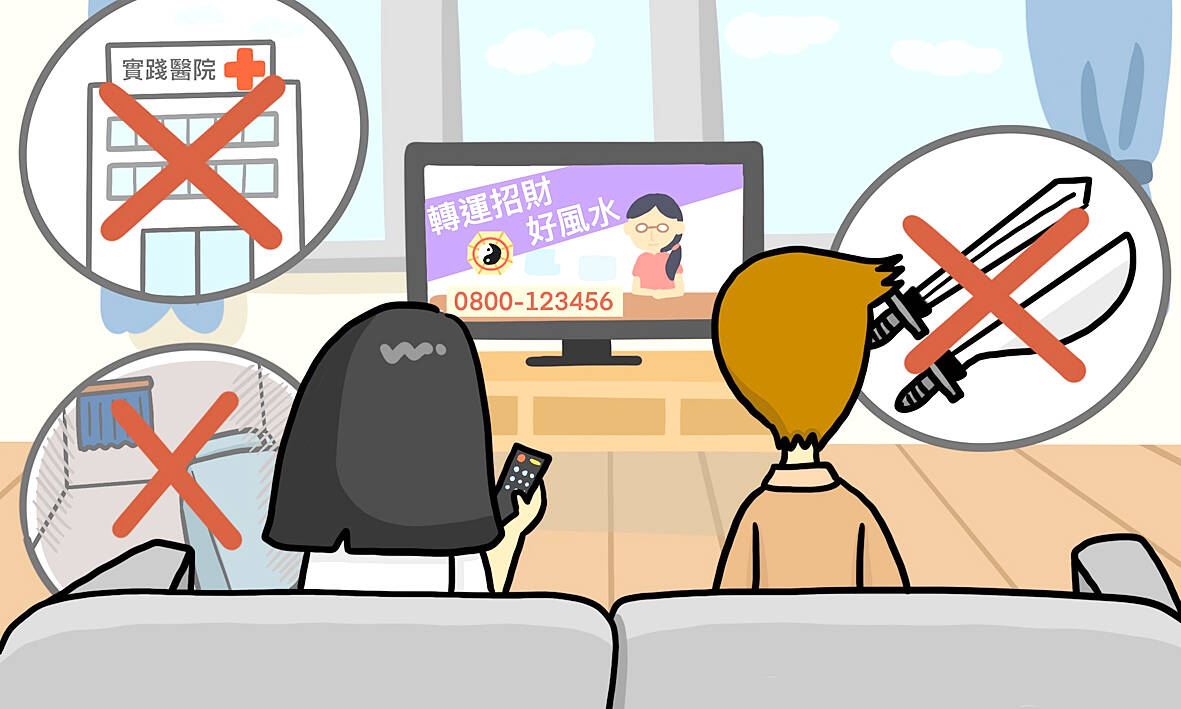對話 Dialogue
小實:馬克,你聽過「風水」嗎?

Xiǎoshí: Mǎkè, nǐ tīngguò fēng shuǐ ma?
馬克:我聽過,是臺灣人買房子的時候會注意的事情,對吧?
Mǎkè: Wǒ tīngguò, shì Táiwān rén mǎi fángzi de shíhòu huì zhùyì de shìqíng, duì ba?
小實:對啊,臺灣人相信居住的環境會影響人的個性和健康。
Xiǎoshí: Duì a, Táiwān rén xiāngxìn jūzhù de huánjìng huì yǐngxiǎng rén de gèxìng hàn jiànkāng.
馬克:我聽其他臺灣的朋友說,住在醫院附近容易生病,是嗎?
Mǎkè: Wǒ tīng qítā Táiwān de péngyǒu shuō, zhù zài yīyuàn fùjìn róngyì shēngbìng, shì ma?
小實:是啊,還有家裡的客廳的光線要足夠,太暗的話會影響運氣哦。
Xiǎoshí: Shì a, hái yǒu jiālǐ de kètīng de guāngxiàn yào zúgòu, tài àn dehuà huì yǐngxiǎng yùnqì ō.
馬克:這點我同意,要是陽光照不進客廳,確實可能會影響心情。
Mǎkè: Zhè diǎn wǒ tóngyì, yào shì yángguāng zhào bù jìn kètīng, quèshí kěnéng huì yǐngxiǎng xīnqíng.
小實:還有人說,家裡不適合放刀或劍,因為這些東西是武器。
Xiǎoshí: Hái yǒu rén shuō, jiālǐ bú shìhé fàng dāo huò jiàn, yīnwèi zhèxiē dōngxi shì wǔqì.
馬克:哇!看來「風水」要注意的事情很多耶。
Mǎkè: Wā! Kàn lái fēng shuǐ yào zhùyì de shìqíng hěn duō ye.
小實:對啊,有機會我也想好好研究一下。
Xiǎoshí: Duì a, yǒu jīhuì wǒ yě xiǎng hǎohǎo yánjiù yíxià.
翻譯 Translation
Xiaoshi: Mark, have you heard of Feng Shui?
Mark: Yes, I have. It’s something Taiwanese pay attention to when buying a house, right?
Xiaoshi: Yes, Taiwanese believe that the living environment can affect a person’s personality and health.
Mark: I heard from other Taiwanese friends that living near a
hospital makes it easy to get sick, is that true?
Xiaoshi: Yes, that’s right. Also, there should be sufficient lighting in the living room at home. If a room is too dark, it may affect your luck.
Mark: I agree with that. If sunlight can’t come into the living room, it can affect one’s mood.
Xiaoshi: Some people also say that you shouldn’t place knives or swords at home because they are considered weapons.
Mark: Wow! It seems like there are many things to pay attention to in Feng Shui.
Xiaoshi: Yes, you’re right. If I get the chance, I would like to study it thoroughly.
單字片語 Vocabulary
1. 風水 (fēngshuǐ) Feng Shui, geomancy
2. 相信 (xiāngxìn) believe
3. 居住 (jūzhù) live
4. 環境 (huánjìng) environment
5. 個性 (gèxìng) personality
6. 其他 (qítā) other
7. 光線 (guāngxiàn) the light
8. 足夠 (zúgòu) enough
9. 確實 (quèshí) really
10. 武器 (wǔqì) weapons
教材音檔 Audio Files
教材影片 Video Files:
https://www.instagram.com/celc.nou_tw/guide/_/17999106352646292/
實踐大學華語中心提供
By Shih Chien University Chinese Language Center: https://chineseusc.com/

>> Bilingual Story is a fictionalized account 雙語故事部分內容純屬虛構

A: China’s animated blockbuster “Ne Zha 2” also smashed a box office record recently. B: It’s No. 7 among the world’s best-selling films, grossing more than US$2 billion globally. A: I t has even become the world’s highest-grossing animated film, while the political metaphors in it are causing controversy. B: But who is Ne Zha anyway? A: Ne Zha, often spelled as “Nezha,” is actually a mythical teenage deity with superpowers. A: 中國動畫片《哪吒2》最近也打破紀錄。 B: 該片已衝上影史票房排行榜第7名,全球狂賣超過20億美元。 A: 聽說它甚至是全球最賣座的動畫片,影片中的政治隱喻卻引爆爭議! B: 但哪吒是誰? A: 哪吒的名字常被拼成「Nezha」,是神話中具有超能力的青少年神明。

You enter an old-fashioned detective’s office. The door locks with a click as a radio buzzes: “Rookie detectives, a priceless diamond is missing! Solve the case in one hour.” The room is filled with clues — photographs, coded messages and secret compartments. As the grandfather clock ticks, you and your friends must work to unlock the secrets. This is what escape rooms are all about — immersive adventure games where you solve puzzles and escape the themed setting within a time limit. The concept of “escape rooms” dates back to early first-person video games. In 1988, John Wilson introduced

A: Were there any highlights at the Oscars this year? B: With 13 nods, French director Jacques Audiard’s “Emilia Perez” broke the record for most Oscar nominations earned by a non-English film. A: Wow, it broke the record of 10 Oscar nominations set by Taiwanese director Ang Lee’s “Crouching Tiger, Hidden Dragon.” B: On the eve of the Oscars, Lee was honored with the Lifetime Achievement Award at the Directors Guild of America (DGA) Awards. A: It seems that Hollywood has finally become more diverse. A: 今年的奧斯卡獎有什麼亮點嗎? B: 法國導演賈克歐迪亞的《璀璨女人夢》榮獲13項提名,打破了非英語片紀錄! A: 哇打破了台灣導演李安的《臥虎藏龍》10項提名紀錄。 B: 李安則在奧斯卡前夕,獲頒美國導演工會「終身成就獎」。 A: 看來好萊塢終於比較多元化啦。 (By Eddy Chang, Taipei Times/台北時報張迪)